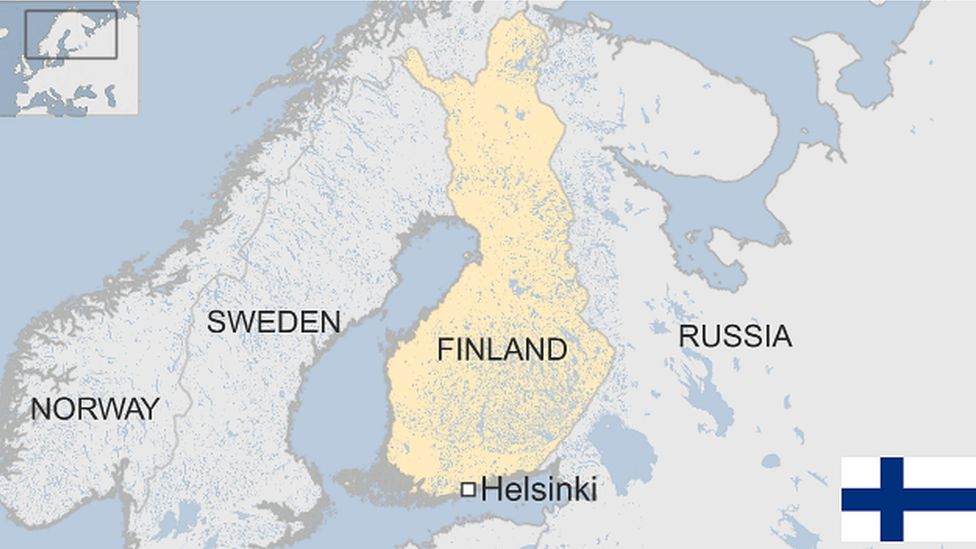Finland country profile
- Published

In spite of its relatively small population, Finland has been a trendsetter in many fields since independence in 1917.
It scores consistently well on international ratings for stability, freedom, public safety and social progress
Its parliament was the first to adopt full gender equality, granting men and women the right not only to vote but also to stand for election in 1906.
Finland declared independence from Russia in 1917 but following defeat by the Soviet Union in World War Two, it had to tolerate strong influence from Moscow until the end of the Cold War.
Russia's invasion of Ukraine in 2022 saw a sea-change in Finland's foreign policy, and it joined Nato in 2023.
- Read more country profiles - Profiles by BBC Monitoring
REPUBLIC OF FINLAND: FACTS
- Capital: Helsinki
- Area: 338,455 sq km
- Population: 5.6 million
- Languages: Finnish, Swedish plus Sami, Karelian, Finnish Kalo
- Life expectancy: 79 years (men) 84 years (women)
LEADERS
President: Alexander Stubb
Conservative former Prime Minister Alexander Stubb won the February 2024 presidential election, in Finland's first election since it joined the Nato military alliance in April 2023.
Mr Stubb takes a hardline approach towards Russia, with which Finland shares a long land border. He had said that joining Nato was a "done deal" for his country as soon as Russian President Vladimir Putin launched a full-scale invasion of Ukraine in February 2022.
He also stressed that it was "rather self-evident that it's difficult to have any kind of political dialogue with Putin as long as Russia is waging an aggressive war against Ukraine.
"So, I don't see any kind of communication with Putin or with the Russian political leadership in the near future. We all want to find a pathway towards peace, but it seems to me that that pathway happens only through the battlefield at the moment."
Finland's president has a largely ceremonial role with fewer powers now than in previous decades, but can be an important shaper of public opinion.
Prime Minister: Petteri Orpo
Conservative leader Petteri Orpo won a close three-way election in April 2023, defeating the centre-left incumbant Sanna Marin.
His National Coalition Party secured 20.8% of the vote, ahead of the right-wing populist Finns Party on 20.1% and Marin's centre-left Social Democrats on 19.9%.
He leads a coalition of the conservative NCP, nationalist Finns, the minority-language Swedish People's Party and the Christian Democrat.
Orpo, who defines himself as a "fiscal conservative", campaigned on a platform of reducing Finland's government debt and the annual budget deficit as well as cutting income taxes.
The election was largely fought on Finland's economy as all the mainstream parties backed Nato membership.
MEDIA
TV is the most popular medium. Public broadcaster Yle operates alongside commercial networks.
The state of media freedom is rated highly by international press freedom organisations.
TIMELINE
Some key events in Finland's history:
12th-13th Centuries - Series of crusades by Danes and Swedes to subjugate Finns and convert them to Christianity.
13th Century onwards - Finland comes under Swedish rule
1695-97 - The Great Famine, a catastrophic famine affecting Estonia, Finland, Latvia, Norway and Sweden, kills about a third of Finland's population.
1700-21 - Great Northern War: Russian troops occupy Finland and Sweden cedes Finnish territory to Russia. Finland is hit by a severe plague which is carried along trade routes and by invading armies.
1742-43 - Russo-Swedish War: Russian troops again occupy Finland, and Sweden again cedes Finnish territory to Russia.
1808 - Russian invasion of Sweden supported by Napoleon.
1809 - Finland is ceded to Russia by the Swedes. Finland becomes an autonomous Grand Duchy in the Russian Empire and retains a considerable amount of autonomy. Finns keep their own legal system, religion, and are exempt from Russian military service.
1899 onwards - Attempt at Russification of Finland, including conscription of Finnish men into the Russian army and the imposition of Russian as an official language. Campaign of civil disobedience begins.
1906 - Parliament Act establishes universal suffrage, including the right for women to stand for elected office, for the first time in Europe.
1917 - The Russian Revolution allows Finland to declare its independence.
1918 - Civil war: a rebellion by left-wing Red Guards is put down by General Carl Gustaf Emil Mannerheim.
1939-40 - Winter War: despite fierce resistance to invading Soviet troops, the Finns are forced to concede 10% of their territory.
1941-44 - The Continuation War: conflict between Finland and the Soviet Union during World War Two, ends in an armistice and Finland having to pay reparations.
1948 - Finland signs friendship treaty with the Soviet Union, and throughout Cold War pursues a policy of friendly neutrality towards Moscow.
1955 - Finland joins United Nations and Nordic Council.
1992 - Friendship treaty with Soviet Union of 1948 declared null and void following the collapse of the Soviet Union. Finland turns increasingly towards the west.
1995 - Finland joins the European Union.
2000 - Tarja Halonen elected as Finland's first female president.
2002 - Euro replaces the Finnish mark.
2010 - Finland becomes world's first country to give its citizens a legal right to broadband internet.
2016 - Finland signs an agreement on closer defence collaboration with the United States amid growing concern over Russian military activities in the Baltic Sea region.
2022 - In response to Russia's invasion of Ukraine, Finland and Sweden apply for Nato membership.
2023 - Finland becomes a member of Nato.
- Published15 January
- Published29 March 2023
- Published28 March 2023
- Published25 March
- Published22 August 2023
- Published22 August 2023